ADCETRIS + LENALIDOMIDE + RITUXIMAB may advance your treamtent for another chance at tomorrow
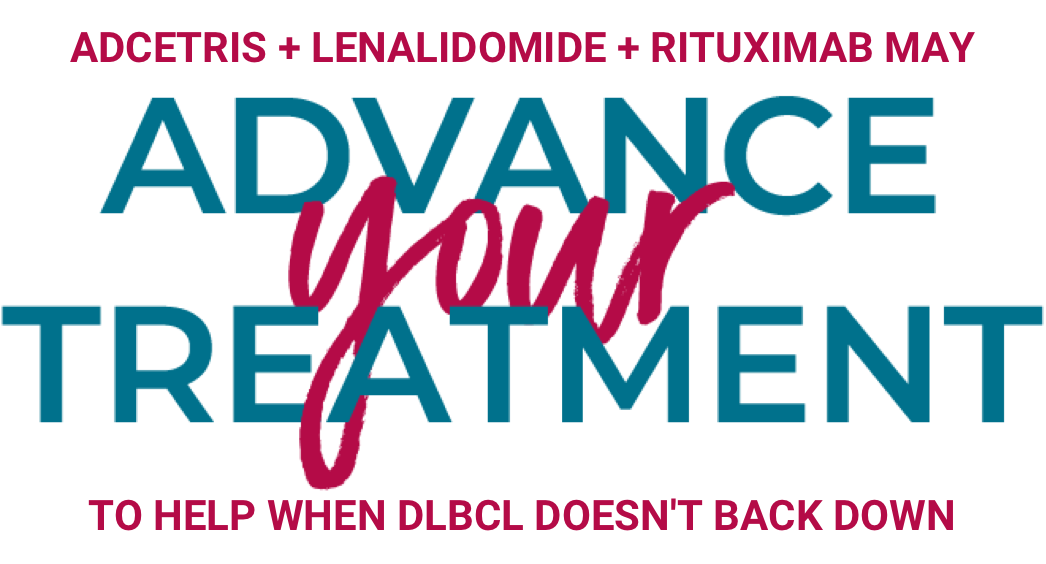
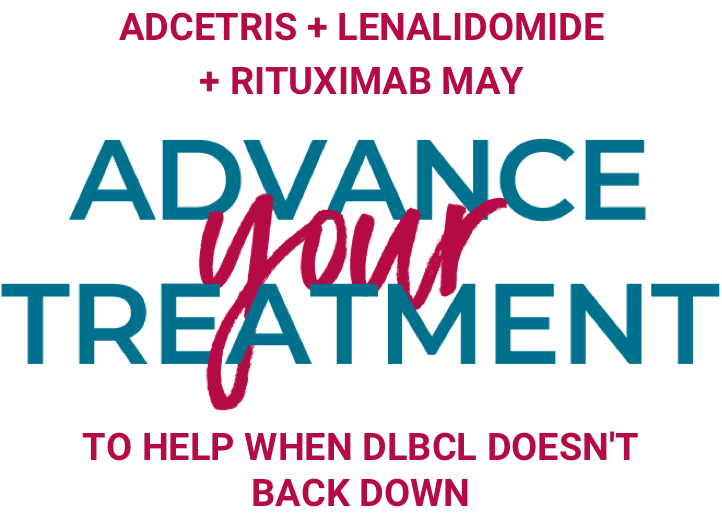
ADCETRIS, in combination with lenalidomide and rituximab, is approved to treat adults with diffuse large B-cell lymphoma (DLBCL) that has come back (relapsed) or didn’t respond (refractory) to 2 or more prior treatments and who are not candidates for
stem cell transplant (HSCT) or
CAR-T therapy.
Learn more about the ECHELON-3 study results and ask your doctor if ADCETRIS is an option for you.
See study resultsHow does ADCETRIS work?
Step 1
ADCETRIS aims to attach to cells that have a protein on their surface called CD30.
Step 2
Once attached, ADCETRIS is brought into the cell and released.
Step 3
The drug stops the cell from being able to grow and divide, causing the cell to die.
CD30 is not commonly found on healthy cells, ADCETRIS may still harm normal cells and cause side effects. Talk to your doctor if you have questions about how it works and about side effects.
ECHELON-3 study information
Study design
ECHELON-3 was a large, international, clinical study of 230 people that compared the effectiveness and safety of ADCETRIS plus lenalidomide and rituximab to placebo plus lenalidomide and rituximab in adult patients with relapsed or refractory DLBCL after 2 or more prior treatments.
- 112 people were assigned to receive ADCETRIS plus rituximab every 3 weeks and take lenalidomide (oral medication) daily until disease progression or if side effects were unacceptable
- 118 people were assigned to receive placebo plus rituximab every 3 weeks and take lenalidomide (oral medication) daily until disease progression or if side effects were unacceptable
Researchers reviewed the results of these treatments at approximately 16 months.
Overall Survival Results
Overall survival was significantly higher with ADCETRIS plus lenalidomide and rituximab compared to placebo plus lenalidomide and rituximab
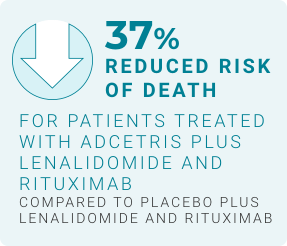

- Median overall survival in the ADCETRIS plus lenalidomide and rituximab group was 13.8 months compared to 8.5 months in the placebo plus lenalidomide and rituximab group
TUMOR RESPONSE RESULTS
More people treated with ADCETRIS plus lenalidomide and rituximab saw their tumors get smaller or become undetectable compared to those receiving placebo plus lenalidomide and rituximab
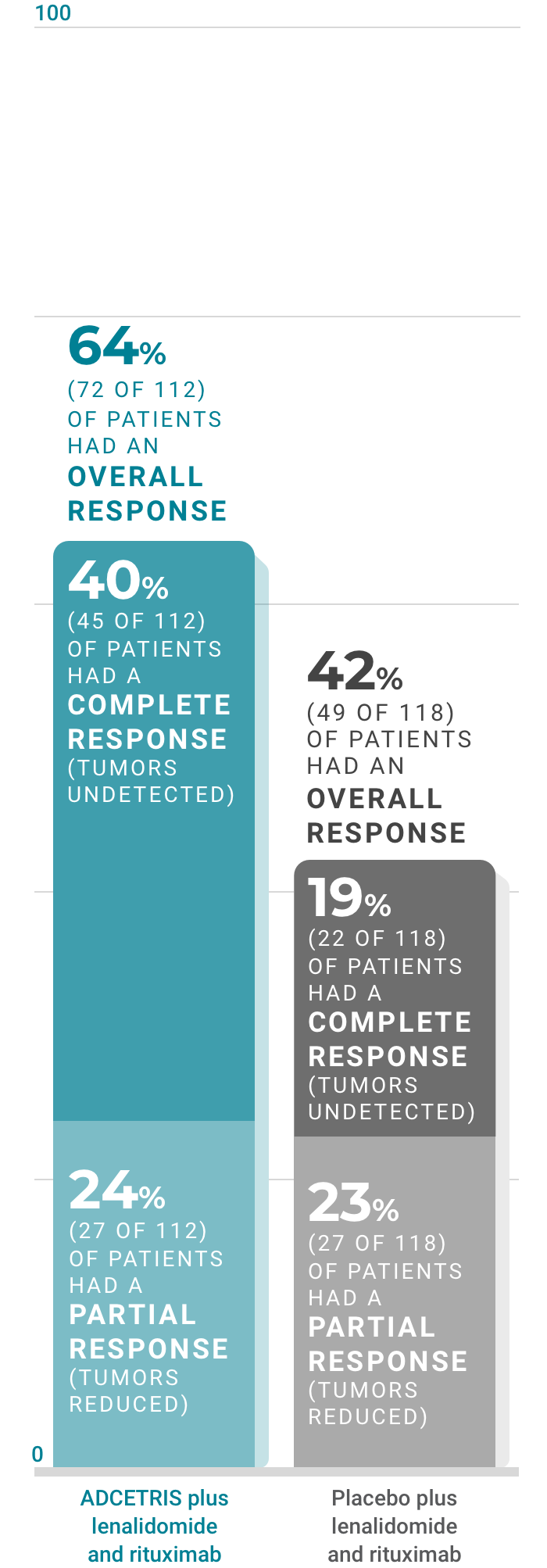
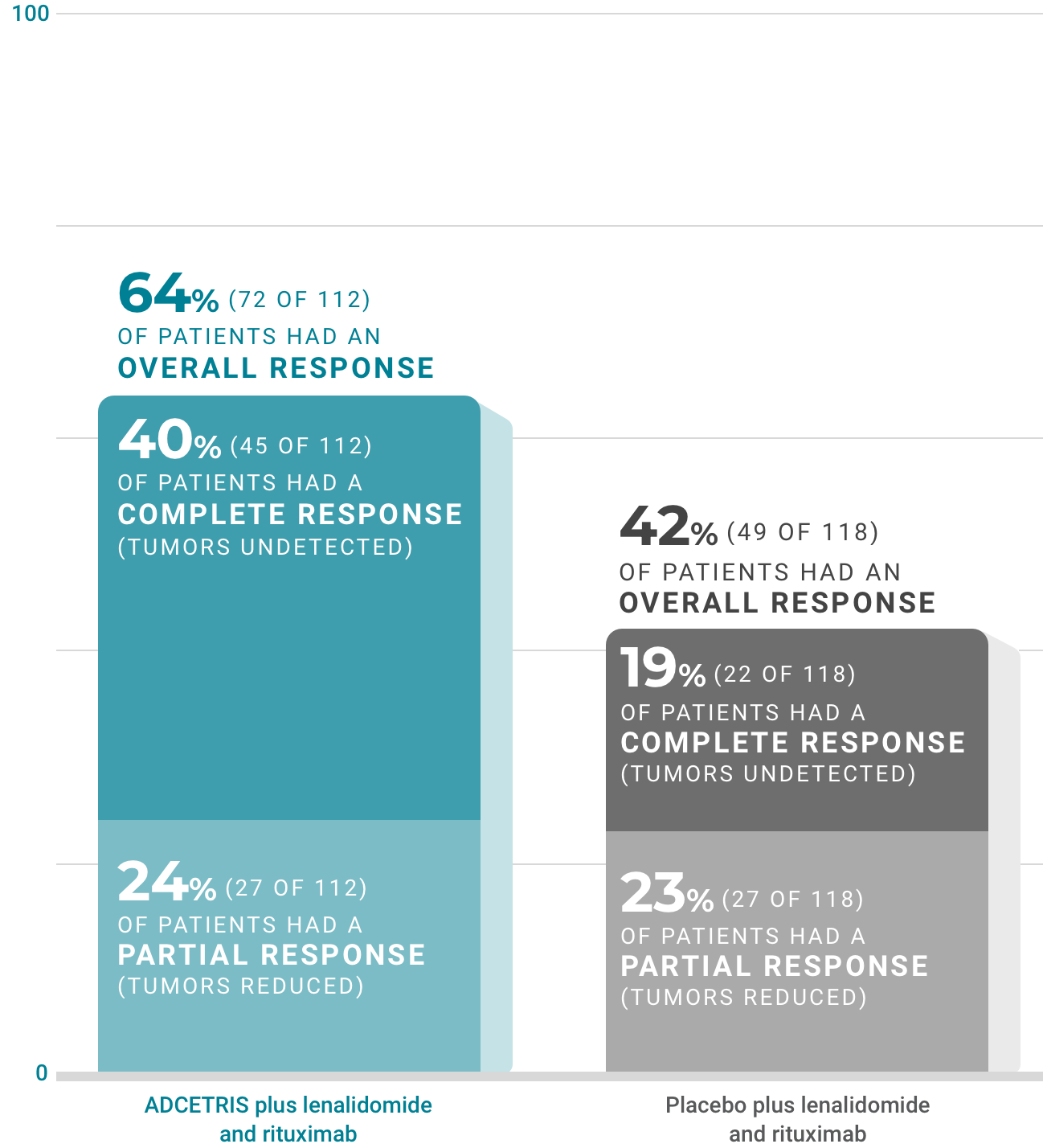
Tell your doctor about any side effect concerns you have
Your doctor should prescribe granulocyte colony-stimulating factor (G-CSF) along with your ADCETRIS treatment right at the start. G-CSF is a medication that may help reduce the chance of neutropenia (low white blood cell count).
Don’t stop, change, or delay your ADCETRIS plus lenalidomide and rituximab treatment unless directed by your doctor. Your doctor may take additional steps to help manage side effects, including:
- Reducing your ADCETRIS dosage, or delaying your next dose, until symptoms improve
- Stopping ADCETRIS completely if side effects are severe or do not improve
Resources and support
From cost to resources, support may be available
The patient support programs available through Pfizer are designed to help patients begin their prescribed ADCETRIS treatment. If eligible and enrolled, you can receive personalized support, including:
- Confirming your insurance coverage
- Evaluating out-of-pocket costs and available copay options
- Helping you access alternative support options if you can’t afford ADCETRIS*
Talk to your healthcare provider to learn how to enroll in the Pfizer Patient Assistance Program.
Visit the websiteInformation provided by patient support programs from Pfizer is not intended to be a substitute for your healthcare provider. Discuss any questions you may have about your disease and your treatment with your healthcare team.
*Financial support may be provided through foundation referral. Pfizer does not guarantee that enrollment will result in coverage and/or reimbursement.
Apps to manage your care
Focus on Lymphoma
This app from the Lymphoma Research Foundation offers:
- Tailored content for your type of cancer
- A way to track your medications, blood counts, and doctor discussions
- Educational resources, stories of hope, and diagnosis and treatment information
- Resources, financial assistance, counseling, and help finding a doctor
- Ways to connect with others
LLS Health Manager
This app from the Leukemia and Lymphoma Society features:
- Side effect, medication, food, and hydration trackers
- Questions for your doctor
- Meal-planning tools
- Shared caregiver access
- Education, support, and resources
Helpful links
Connect with other people living with cancer and their caregivers
The organizations listed are independent from, and not sponsored by, Pfizer. This information is provided as a resource for patients and caregivers and is not an endorsement or guarantee of assistance. The information/links are not meant to replace a physician’s medical advice. Pfizer is not responsible for the content or services of these providers.

The Leukemia & Lymphoma Society funds lifesaving blood cancer research around the world, provides free information and support services, and acts as a voice for all blood cancer patients striving to achieve their mission to cure blood cancer and improve the quality of life of all patients and their families.

Devoted to improving care through patient education and support services and improving outcomes through investment in the most promising lymphoma research.

May provide resource navigation, counseling, support groups, education, publications, and financial and co-payment assistance to certain patients.

Provides professionally led support and navigation services, along with social connections and award-winning education available at 196 Cancer Support Community, Gilda’s Club, and healthcare partner locations as well as online and over the phone.

Supports people with cancer who are trying to manage their career with expert advice, interactive tools, and educational events.

Provides transplant patients, survivors, and their loved ones with emotional support and information about CAR T-cell therapy, peripheral blood stem cell, stem cell, and cord blood transplants.


